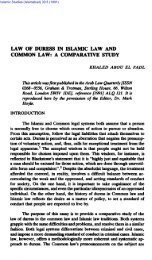THE ECONOMIC DILEMMA OF THE MUSLIM WORLD
THE ECONOMIC DILEMMA OF THE MUSLIM WORLD
THE ECONOMIC DILEMMA OF THE MUSLIM WORLD
Create successful ePaper yourself
Turn your PDF publications into a flip-book with our unique Google optimized e-Paper software.
Islamic Studies 35:3 ( 1 996) 305<br />
Even if the steps we have taken with the reader in these pages do not<br />
prove commendable from a practical point of view, for worse, we believe they<br />
would not be quite in vain. The issues we have underlined and our manner of<br />
tackling them would, at least, serve as an excercise for Muslim thought in<br />
conducting itself freely in face of the economic dilemmas.<br />
Indeed the movement of ideas, whatever its direction, provokes further<br />
thinking to support, correct or even resist it. I also believe that Muslim thought<br />
is called upon to plunge itself in the great battlefield to face the challenge of the<br />
economic universe. This book calls on him to enter it as a free man who does<br />
not bow his head either before the golden calf or before the embellishment of<br />
the Marxist doctrine.<br />
'Government abstention from intetierence with individual action especially in the economic<br />
field. (Loissez faire, laissez aller, literally means 'let make, let go').<br />
'Here, as elsewhere in his writings, Bennabi betrays a tragic ignorance of the genesis of the<br />
Muslim political movement in the Sub-continent, mainly due to dearth of literature on the subject<br />
in Ardbic and French and the culpable failure of the Muslims of the Subcontinent to present their<br />
case abroad.<br />
As a matter of fact, far from being a chance product of the utilisation of a lucky opportunity,<br />
Pakistan was the outcome of a conscious movement and a deliberate effort directed towards a<br />
definite end. In his presidential address at the All-India Muslim League session at Allahabad, 29<br />
December 1930, lqbal expounded at length the historical and philosophical bases of Muslim demand<br />
for self-determination. The religious ideal of Islam, he said. is organically related to the social order<br />
it has created so that the rejection of one will eventually involve the reje3ion of the other. . . The<br />
unity of an Indian nation, therefore, must be sought got in the negation but in the mutual harmony<br />
and cooperation of the many. Calling for the forbtion of a consolidated Muslim state in the best<br />
interest of India and Islam, he concluded: ". . . For India it means security and peace resulting from<br />
an internal balance of power: for Islam an opportunity to rid itself of the stamp that Arab<br />
imperialism was forced to give it, to mobilise its law, its education, its culture and to bring them<br />
into closer contact with its own original spirit and with the spirit of modem times."<br />
Ten years later. voicing the Muslim demand for an independent Muslim state Jinnah presented<br />
the same case as lucidly in political terms. Islam and Hinduism, he said, are not religions in the<br />
strict sense of the word hut are in fact two different orders. Hindus and Muslims "belong to two<br />
different religious philosophies. social customs and literatures. They neither inter-marry nor inter-<br />
dine together and indeed helong to two different civilisations hased on conflicting ideas and<br />
conceptions. . . To yoke together two such nations under a single state, one as a numerical minority<br />
and the other as a majority, must lead to growing discontent and final destruction of any fabric that<br />
may be built up for ihe government of such a state. . ." (Lahore, 23 March 1940). The case for<br />
Pakistan has been vindicated over the years by the continuing persecution of Muslims in Bharat and<br />
the gruesome suppression of Muslims in Kashmir.<br />
'Frederick Winslow Taylor (1856-1915). American economist and engineer who presented<br />
a system of scientific organisation of work, control of the time of execution and remuneration of the<br />
worker.<br />
mough European incursions against Japan began in the last half of the 16th century, it was<br />
the appearance of a powerful American fleet under Commodore Perry in 1853. followed by English.<br />
Russian and French emissaries which finally forced the country to abandon its policy of national<br />
isolation and opened it to foreign trade and residence in 1859.<br />
'Gottfried Wilhelm Leibniz (1646-1716) German philosopher and mathematician.<br />
y1638-1715) King of France (1643-1715)<br />
'Joseph Ernest Renan (1823-1892). French philosopher and philologist.
















